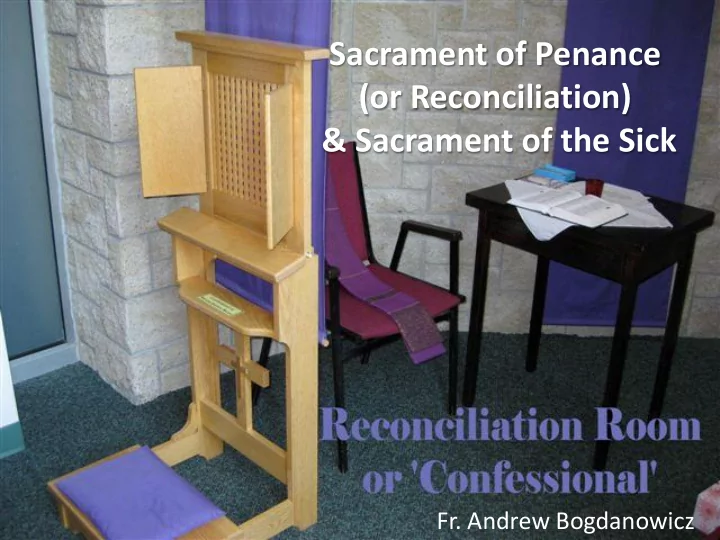

Sacrament of Penance (or Reconciliation) & Sacrament of the Sick Fr. Andrew Bogdanowicz
Reconciliation or Penance (John 20:19,22-23) • Penance is a Sacrament of Healing in which Jesus Christ himself, through the actions of a priest, forgives the sins committed after Baptism. • It is the way God restores his bond with us after we have broken it by committing – mortal sin; or – damaged it by committing venial sin.
Doesn’t Baptism take away our sins? • Though Baptism made us new and free from the blemish of sin, it has not destroyed our weakness in relation to sin nor the inclination to sin. • God gives us the Sacrament of Penance as a spiritual healing, a way to remove sin when we fall into it. ….
Doesn’t Baptism take away our sins? • …. • We must struggle to be holy. By constant conversion, we become holy (perfect). • Reconciliation is the opportunity for many more conversions . For as often as we sin, Jesus wants us to repent and return to Him once again.
Going to Confession (or celebrating Reconciliation) • Confession must be made out of a sincere desire to live the faith. • For confession to be fully worth worthwhile, the penitent must – be contrite for his/her sins; and – do the assigned penance.
How do I go to Confession or Reconciliation? • An examination of conscience (see bookmark for example) • Sorrow for sin • A resolve to avoid sin in the future • Confession of sins; – for mortal sins according to their species and numbers
How do I go to Confession or Reconciliation? • Making an act of contrition (see bookmark for example) – (perfect and imperfect) • Doing the assigned penance
How often to I need to go to Confession? • True love of Jesus should lead us to confess as soon as possible after any mortal sin. • Monthly confession is recommended.
Venial Sin & Mortal Sin • Venial sin harms the spiritual relationship between God and his people, but • mortal sin completely breaks the spiritual relationship between God and us.
Mortal Sin • Grave or serious matter – the act must be serious as defined by the Church • Full knowledge – you must be aware this act will separate you from God • Complete consent – you know it is a grave and choose to do it anyway.
What can we do? • When a person realizes he/she has offended God, the ugliness of his/her sins seems overwhelming. • We must concentrate on the desire to return to God, rather than being afraid because of sins.
Anointing of the Sick (James 5:14-16) • Anointing of the Sick is a Sacrament of Healing • gives health of soul and sometimes body by prayer and anointing with oil.
Anointing of the Sick (James 5:14-16) • Its purpose is to confer special grace on Christians who are suffering from grave illness or the exhaustion of old age.
Christ the Healer • Christ healed people both to demonstrate that He was the Messiah and out of compassion for those who were suffering. • These act show us that the Kingdom of God has come upon us, and that this Kingdom brings a more radical healing than merely physical cures:
Christ the Healer Sacrament of the Sick brings healing and victory over sin and death through Christ’s own death on the cross. • Mark 1:30-31 • Luke 14:1-6
Anointing of the Sick • Anointing of the Sick is administered by a priest or bishop. • The principal elements are the – laying-on of hands, – prayer over the sick person, and – anointing of the forehead and palms with oil which has been blessed a bishop on Holy Thursday (The Chrism Mass).
Effects of the sacrament of Anointing of the Sick • Union of the sick person to the Passion of Christ. • Strength, peace, and courage to endure in a Christian manner the suffering of illness or old age. • Forgiveness of sins and of penalty for sin if the person is sorry for his/her sins and unable to receive the Sacrament of Penance. • …
Effects of the sacrament of Anointing of the Sick (continued) • Restoration of sanctifying grace if sorrow for mortal sin is present. • Restoration of health if it is good for the salvation of the person’s soul. • Preparation for the moment of death (resist devil’s temptations)
When to have this Sacrament? There is no need to wait till a person is in danger of death to call the priest. • Is this a life-threatening or grave disease? • Is the person about to undergo surgery for a serious illness? • Is the person of advanced age? • Has a fatal illness become more serious?
• Caring for the sick is not an option but a requirement. • We should pray for a happy death.
Recommend
More recommend